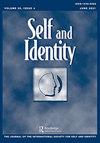好处是:在危机中,人们如何理解困难很重要
IF 2.1
4区 心理学
Q3 PSYCHOLOGY, SOCIAL
引用次数: 1
摘要
摘要我们使用IBM理论和新冠肺炎大流行来测试以下预测:人们如何应对需要新的困难任务/目标的全面生活困难,取决于他们从这些困难经历中推断出自己的身份(N=698名美国成年人,三个数据集)。如果人们经历了任务/目标的困难,这意味着它的重要性,而生活困难则是自我提升的机会,那么他们更有可能看到一线希望。将困难视为重要的人更有可能戴口罩、保持距离和洗手,部分原因是他们在疫情中看到了自己的一线希望;对于困难和改善,一线希望完全介导了这些影响。人们将他们的困难视为改善心态的重要性和困难来应对新的生活困难。本文章由计算机程序翻译,如有差异,请以英文原文为准。
The upside: How people make sense of difficulty matters during a crisis
ABSTRACT We used IBM theory and the COVID-19 pandemic to test the prediction that how people respond to all-encompassing life difficulties requiring novel difficult tasks/goals is a function of what they infer about their identities from these experiences of difficulty (N = 698 U.S. adults, three datasets). People were more likely to see silver linings if they experienced difficulties with a task/goal as implying its importance and life difficulties as opportunities for self-improvement. People who endorsed difficulty-as-importance were more likely to mask, distance, and wash hands in part because they saw silver linings for themselves in the pandemic; for difficulty-as-improvement, silver linings fully mediated these effects. People apply their difficulty-as-importance and difficulty-as-improvement mindsets to cope with novel life difficulties.
求助全文
通过发布文献求助,成功后即可免费获取论文全文。
去求助
来源期刊

Self and Identity
PSYCHOLOGY, SOCIAL-
CiteScore
5.10
自引率
5.00%
发文量
26
期刊介绍:
Work on self and identity has a special place in the study of human nature, as self-concerns are arguably at the center of individuals" striving for well-being and for making sense of one"s life. Life goals develop and are influenced by one"s view of what one is like, the way one would ideally like to be (or would like to avoid being), as well as one"s perceptions of what is feasible. Furthermore, conceptions of self and the world affect how one"s progress towards these goals is monitored, evaluated, redirected, re-evaluated, and pursued again. Thus, the “self” as a construct has far-reaching implications for behavior, self-esteem, motivation, experience of emotions and the world more broadly, and hence for interpersonal relationships, society, and culture.
 求助内容:
求助内容: 应助结果提醒方式:
应助结果提醒方式:


